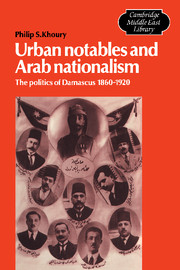Book contents
- Frontmatter
- Contents
- List of maps
- Note on transcription
- Preface
- Introduction
- 1 The political configuration of Damascus in 1860
- 2 The consolidation of leadership in Damascus after 1860
- 3 Damascus notables and the rise of Arab nationalism before World War I
- 4 Notables, nationalists and Faysal's Arab government in Damascus, 1918–20
- Conclusion
- Notes
- Bibliography
- Glossary of Arabic, Persian and Turkish terms
- Index
1 - The political configuration of Damascus in 1860
Published online by Cambridge University Press: 14 October 2009
- Frontmatter
- Contents
- List of maps
- Note on transcription
- Preface
- Introduction
- 1 The political configuration of Damascus in 1860
- 2 The consolidation of leadership in Damascus after 1860
- 3 Damascus notables and the rise of Arab nationalism before World War I
- 4 Notables, nationalists and Faysal's Arab government in Damascus, 1918–20
- Conclusion
- Notes
- Bibliography
- Glossary of Arabic, Persian and Turkish terms
- Index
Summary
In the heat of July 1860, an outbreak of violence rocked Damascus. Mobs of beduin, Druzes and other neighboring villagers, Kurdish auxiliaries, and street toughs perpetrated eight days of massacre and pillage mainly in the ancient Christian quarter of Bab Tuma–eight days that would have resounding effects on political developments in Damascus for generations.
This event gave the Ottoman government an opportunity to reassert its control over Damascus. Fu'ad Pasha, the reformist Foreign Minister who had negotiated a temporary settlement of the civil war in Mount Lebanon, followed the newly appointed Ottoman governor into Damascus, backed by four thousand troops. Fu'ad knew his task well. In order to obviate French intervention in the name of ‘oriental Christendom’ he hammered out a settlement which compensated the demoralized Christian community and distributed the burden of guilt equitably and swiftly. On one hand, he set up a committee of prominent Damascenes, both Muslim and Christian, to assess compensation for the vast losses suffered by the inhabitants of Bab Tuma. On the other, he jailed, exiled or hanged scores of high-ranking Muslim notables and functionaries for their failure to prevent the bloodbath that had caused some six thousand deaths.
The Christian committee members formed a powerful lobby under Fu'ad Pasha's protection and managed to gain ample compensation for themselves and their clients. Reconstruction in Bab Tuma commenced immediately and the inhabitants were encouraged to return.
- Type
- Chapter
- Information
- Urban Notables and Arab NationalismThe Politics of Damascus 1860–1920, pp. 8 - 25Publisher: Cambridge University PressPrint publication year: 1983

